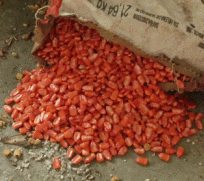
Argentina: To Live with Dignity is to Build a New World
“My papa settled here in 1944,” Pablo Sarmiento says in a serene voice and gentle manner, as he looks at the ruins of his home that was torn down by a multinational’s bulldozers.

“My papa settled here in 1944,” Pablo Sarmiento says in a serene voice and gentle manner, as he looks at the ruins of his home that was torn down by a multinational’s bulldozers.

Source: The New Statesman
Experts predict that there will be ten billion of us by 2100. Feeding the world could be the political challenge of the century.
How will we eat in the future? By 2100, the world’s population is projected to reach ten billion. The highest levels of consumption will be in Europe and North America, most people will live in Asia and the highest population growth rates in Africa – where the population could triple over the next 90 years. If tomorrow augurs ill, today is already pretty dire. The global recession has lowered incomes, raised food prices and pushed the number of hungry people to one billion.

Source: Al Jazeera
Climate change induced extreme weather events and shifting weather patterns are challenging farmer’s ability to feed us.
Wendy Johnston with Oakwyn Farms in Athens, West Virginia, is deeply concerned about how shifting weather patterns are impacting farmers’ ability to feed the global population.
“This year we’re off to a slow start,” Johnston, who farms 40 hectares, told Al Jazeera. “Last year in April we were able to plant, but this year we even had rain, cold and snow a few days in April. The weather has become very unpredictable, and that’s the real problem.”

Last week, thousands of farmers and supporters of Haitian peasant agriculture marched for hours under the hot Caribbean sun to call for more government support for locally grown seeds and agriculture.

Source: Al Jazeera
As almost half of humanity will face water scarcity by 2030, strategists from Israel to Central Asia prepare for strife.
After droughts ravaged his parents’ farmland, Sixteen-year-old Hassain and his two-year-old sister Sareye became some of the newest refugees forced from home by war scarcity.
“There was nothing to harvest,” Hassain said through an interpreter during an interview at a refugee camp in Dadaab, Kenya which is housing some 160,000 Somalis displaced by a lack of water. “There had been no rain in my village for two years. We used to have crops.”

Source: Alternet
What does it mean when progressives celebrate a victory in large part won by GOP-supporting hedge fund managers, Tea Party funders and corporate conglomerates?
Many people are celebrating what seems on the surface a huge win for gay rights, with the passage of a same-sex marriage bill in New York State last week, by a Republican-controlled state senate to boot. This marks a real sea change for LGBT equality in the US, and therefore a major win not only for LGBT people, but also because this has been a major cause for progressives.
Copyright Toward Freedom 2019